

|
Contact Us Table of Contents Search Site Google listing of all pages on this website Site Map Toby Johnson's Facebook page Toby Johnson's YouTube channel Toby Johnson on Wikipedia Toby Johnson Amazon Author Page  Secure site at https://tobyjohnson.com Also on this website: As an Amazon Associate
I earn from qualifying purchases. Toby Johnson's books: Toby's books are available as ebooks from smashwords.com, the Apple iBookstore, etc. FINDING
YOUR OWN TRUE MYTH: What I Learned
from Joseph Campbell: The
Myth
of the
Great Secret
III GAY SPIRITUALITY: The Role of Gay Identity in the Transformation of Human Consciousness
GAY PERSPECTIVE: Things Our Homosexuality Tells Us about the Nature of God and the Universe
SECRET MATTER, a sci-fi novel with wonderful "aliens" with an Afterword by Mark Jordan
GETTING
LIFE IN PERSPECTIVE:
A
Fantastical Gay Romance set in two different time periods
THE FOURTH QUILL, a novel about attitudinal healing and the problem of evil TWO SPIRITS: A Story of Life with the Navajo, a collaboration with Walter L. Williams CHARMED LIVES: Spinning Straw into Gold: GaySpirit in Storytelling, a collaboration with Steve Berman and some 30 other writers THE MYTH OF THE GREAT SECRET: An Appreciation of Joseph Campbell
IN SEARCH OF GOD IN THE SEXUAL UNDERWORLD: A Mystical Journey
Books on Gay Spirituality: White Crane Gay Spirituality Series
Articles and Excerpts:
Review of Samuel Avery's The Dimensional Structure of Consciousness Funny Coincidence: "Aliens Settle in San Francisco" About Liberty Books, the Lesbian/Gay Bookstore for Austin, 1986-1996 The Simple Answer to the Gay Marriage Debate A Bifurcation of Gay Spirituality Why gay people should NOT Marry The Scriptural Basis for Same Sex Marriage
Gay ConsciousnessQ&A about Jungian ideas in gay consciousness What Jesus said about Gay Rights Common Experiences Unique to Gay Men Is there a "uniquely gay perspective"? Interview on the Nature of Homosexuality What the Bible Says about Homosexuality Mesosexual Ideal for Straight Men Waves of Gay Liberation Activity Wouldn’t You Like to Be Uranian? The Reincarnation of Edward Carpenter Why Gay Spirituality: Spirituality as Artistic Medium Easton Mountain Retreat Center Andrew Harvey & Spiritual Activism The Mysticism of Andrew Harvey
Enlightenment
Joseph Campbell's description of Avalokiteshvara You're Not A WaveJoseph Campbell Talks about Aging What is Enlightenment? What is reincarnation? How many lifetimes in an ego? Emptiness & Religious Ideas Experiencing experiencing experiencing Going into the Light Meditations for a Funeral Meditation Practice The way to get to heaven Buddha's father was right What Anatman means Advice to Travelers to India & Nepal The Danda Nata & goddess Kalika Nate Berkus is a bodhisattva John Boswell was Immanuel Kant Cutting edge realization The Myth of the Wanderer Change: Source of Suffering & of Bliss World Navel What the Vows Really Mean Manifesting from the Subtle Realms The Three-layer Cake & the Multiverse The est Training and Personal Intention Effective Dreaming in Ursula LeGuin's The Lathe of Heaven Gay
Spirituality
|
Down through history the nomenclature for what we call LGBTQ+ -- which used to be simply "homosexuality" -- has changed. Each term was chosen at its time to represent how sexual orientation and gender identity were understood. Each term reveals certain facets of gay experience. Wouldn’t You Like to Be Uranian?Uranian -- 19th Century term used by Karl Heinrich Ulrichs in 1864. 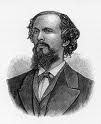 Karl Heinrich Ulrichs (1825-1895) was probably “the first man in the world to come out.” Before this, “homosexuality” was known only as a behavior—sodomy— not a constitutional quality of personality. Ulrichs developed a more complex threefold axis for understanding sexual and gender variance: sexual orientation (male-attracted, bisexual, or female-attracted), preferred sexual behavior (passive, no preference, or active), and gender characteristics (feminine, intermediate, or masculine). The three axes were usually, but not necessarily, linked — Ulrichs himself, for example, was a Weibling (feminine homosexual) who preferred the active sexual role. Ulrichs called homosexuals: Urnings (German) or Uranians. Uranus was the most recently discovered planet in 1781. Like Mars to males and Venus to females, Uranus was to homosexuals. Reference to Uranus the planet is that this is something newly discovered even though it has always been there. Uranian came originally from Greek myth and Plato’s Symposium. Uranus was the god of the heavens and was said to be the father of Aphrodite in “a birth in which the female had no part,” i.e, the distinction between male and female is unimportant. 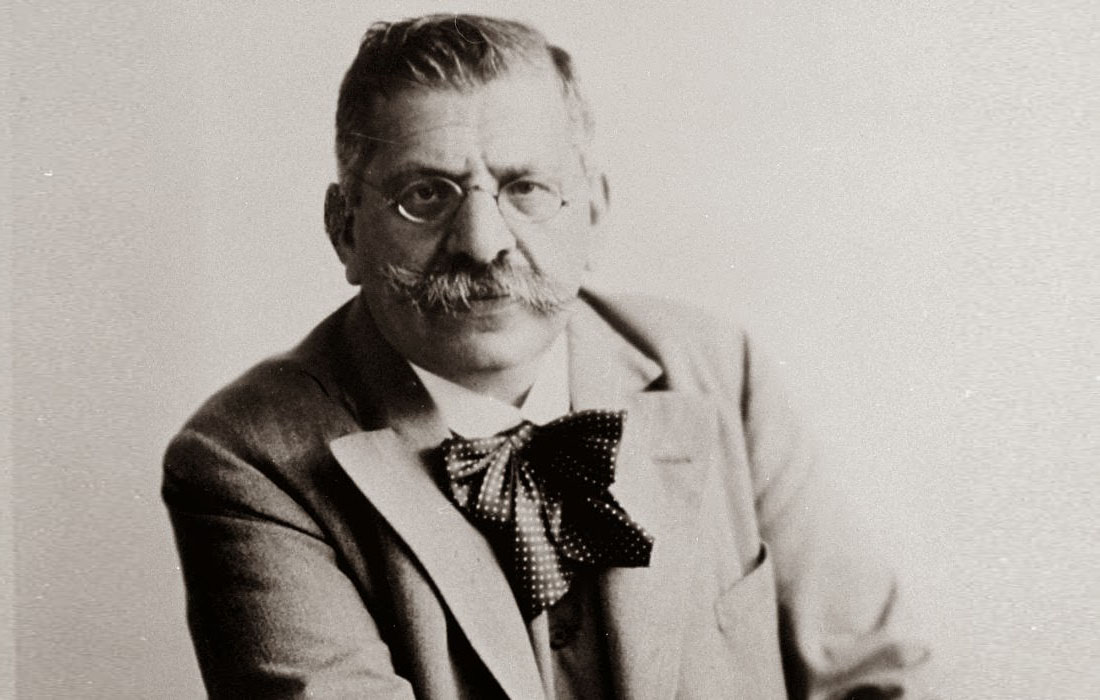 In those early days, the German Sexologists, including Magnus Hirschfeld (1868-1935), (see his Wikipedia page) thought homosexuals were female souls trapped/reincarnated in male bodies. Homosexual was coined by Karl-Maria Kertbeny (1824-1882) in 1869 in an anonymous pamphlet about Prussian sodomy laws. Kertbeny was a travel writer and journalist who wrote about human rights. When he was a young man, a gay friend killed himself because of extortion. That experience gave Kertbeny an “instinctive drive to take issue with every injustice.” He was apparently homosexual himself, but officially denied it. Richard von Krafft-Ebing, in his Psychopathia Sexualis (1886), adopted Kertbeny’s terms and from there they became standard. (see 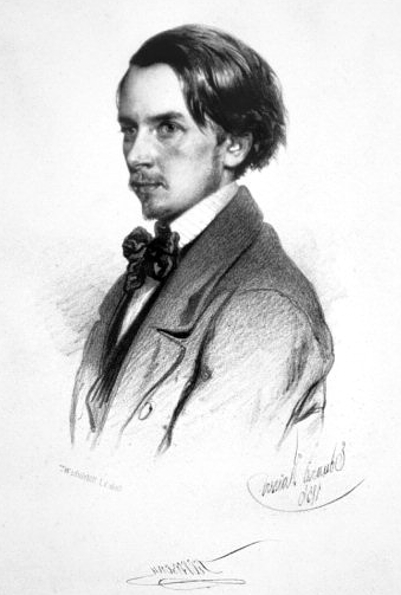 Kertbeny's Wikipedia page) Kertbeny's Wikipedia page)Homosexual has a problem in its etymology. “Homo” means “same” in Greek, so “same sex.” But “sexual” is Latin, not Greek. In Latin “homo” means “Man” as in the generic all mankind. 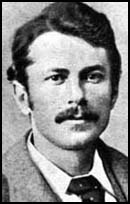 Edward
Carpenter (1844-1929) (in Wikipedia)
and John Addington Symonds (1840-1893)
used Uranian to refer to “the dear love of comrades” in the words of
Walt Whitman (1819-1892). Symonds is probably the first to use
homosexual in the English language. He corresponded with Whitman. (The
photo of the bearded redhead below was one Symonds sent to Whitman.) In
1890, he asked Whitman directly about the homosexual content in the
Calamus poems—to which Whitman denied being homosexual and claimed to
have fathered 6 children. Edward
Carpenter (1844-1929) (in Wikipedia)
and John Addington Symonds (1840-1893)
used Uranian to refer to “the dear love of comrades” in the words of
Walt Whitman (1819-1892). Symonds is probably the first to use
homosexual in the English language. He corresponded with Whitman. (The
photo of the bearded redhead below was one Symonds sent to Whitman.) In
1890, he asked Whitman directly about the homosexual content in the
Calamus poems—to which Whitman denied being homosexual and claimed to
have fathered 6 children.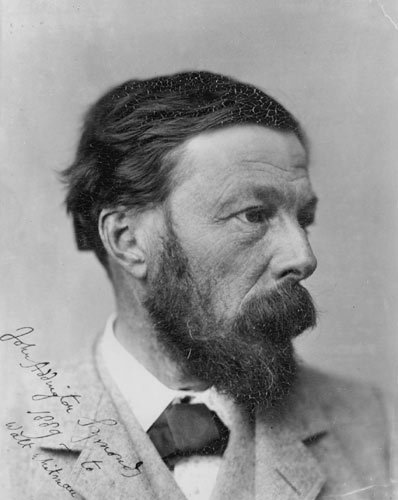 In 1890, Whitman and John Addington SymondsWikipedia page) were the only two “homosexuals” in the world, and they didn’t like each other. Whitman said “No, I am not like you.” Oscar Wilde (1854-1900) also used Uranian in the 1890s.  Oscar Wilde
(Wikipedia
page) coined the icon Green Carnation – which men wore as an
identifier – and there was a fanciful Green Carnation Society in
London
among the class of men called Dandies—which referred to fancy
dress and
elegance, only indirectly gay. The idea was that the green carnation
had to be made by a florist—an artistic creation, something new. The
most famous "dandy," of course, was Yankee Doodle. Oscar Wilde
(Wikipedia
page) coined the icon Green Carnation – which men wore as an
identifier – and there was a fanciful Green Carnation Society in
London
among the class of men called Dandies—which referred to fancy
dress and
elegance, only indirectly gay. The idea was that the green carnation
had to be made by a florist—an artistic creation, something new. The
most famous "dandy," of course, was Yankee Doodle.Edward Carpenter used the term “Intermediate Types” and “Intermediate Sex” and Homogenic Love – homogenic is from two greek roots homos, same, genos sex. While homosexual was half Greek, half-Latin. Carpenter’s emphasis was on love of same, not “inversion” of sexual desire, as psychiatry characterized it. Whitman used the somewhat vague, but clearly meaningful, term: The Dear Love of Comrades. Gay Succession: Walt Whitman, Edward Carpenter, Gavin Arthur, Neal Cassady, Allen Ginsberg, Mike O. (Toby's first psychotherapy client), Toby J. (See The Gay Succession) 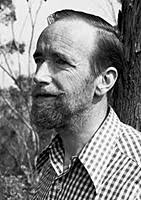 Gerald Heard (1889-1971) (Wikipedia page) coined the term isophyl, meaning love of same in the 1950s. Heard was a British radio announcer, writer and cultural commentator. He moved to California and was part of the Christopher Isherwood, British ex-patriate crowd (WH Auden, Aldous Huxley, Vendanta Society). Heard created a gay, idealistic utopian commune called Trabuco. In 1954 he published an article in ONE Magazine using isophyl. He believed isophyls were a force in the evolution of consciousness. Heard believed that strict gender roles interfered with flexible and innovative thought, and that the isophyl could move beyond the rigidity of traditional masculinity and femininity. 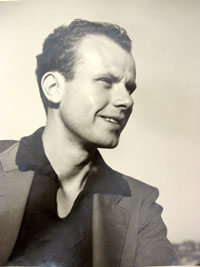 Harry Hay (1912-2002) (Wikipedia page) and Will Geer (who played Grampa Walton) (Wikipedia page) – both idealistic Leftists and Communists – in 1948 were passing out flyers for the Progressive Party candidate Henry Wallace at Venice Beach and saw all the gay men sunning and realized they were an organizable group because they shared homosexuality. Hay came up with the idea of a group for gay men. Originally Bachelors for Wallace, then Bachelors Anonymous, then Society of Fools, it became the Mattachine Society. Suggested by James Gruber (1928-2011) (Wikipedia page), Mattachine referred back to a semi-mythical/ semi-historical societe joyeux in Provence and Languedoc in Medieval France. These were troupes of masked players and troubadours who performed plays and rituals and passed information and news, imagined to be homosexuals. There was a counterculture in Provence at this time which gave rise to the idea of romantic love as the basis for sexual connection – and put a positive spin on homosexual pleasure because it did not trap a soul in matter as heterosexual intercourse did. 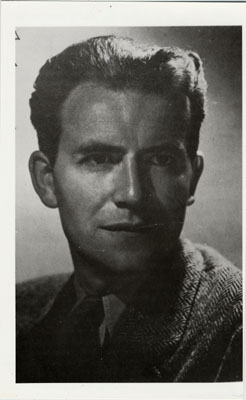 Hay believed that there have always been men who were sexually attracted to other men, rather than to women and women to women rather than to men. It’s an “essential” quality in their personality, and this has always been so. Though it has appeared differently at different times in history, but mostly hasn’t been acknowledged at all in history. The Mattachine Society (Wikipedia page) used the term Homophile, preferring the word for “love” rather than just “sex.” This term was coined by the German astrologist, author and psychoanalyst Karl-Günther Heimsoth in his 1924 dissertation. Harry Hay and the Mattachine were caught up in the McCarthy anti-communist fanaticism of the early 1950s. The anti-communists were also anti-gay. They used the term HOMINTERN, based on the Communist International abbreviation COMINTERM. HOMINTERN (Wikipedia page) is a wonderful term – it implied the understanding and support that homosexuals offered one another across cultures and nationalities. To wit, E.M. Forster’s quote (slightly altered, maybe by Harry Hay) An aristocracy of the sensitive, the considerate, and the plucky are to be found in all nations and classes, and through all the ages. And there is a secret understanding between them when they meet. They represent the true human tradition, the one queer victory of our race over cruelty and chaos. 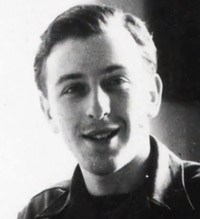 In 1961 in Washinton DC, Frank Kameny (1925-2011) (Wikipedia page) and his protégé Jack Nichols (1938-2005), (Wikipedia page) got the Mattachine out marching for gay rights—and his right not to be fired from his job as a federal astronomer just because he was homosexual. He coined the phrase “Gay is Good.” Kameny insisted the marchers wear suit and tie and not show any public display. 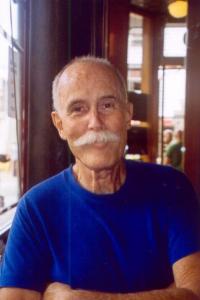 By 1969, the National Mattachine/ Homophile Movement was considered old-fashioned by the youth movement. After expelling Hay in 1953, they adopted a less militant atttitude – homosexuality is a sad condition which happens to people against their will and they shouldn’t be punished anymore by prejudice and laws against sex. They got psychiatrists to come speak about compassion for these sad men. 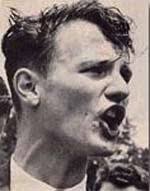 Randy Wicker (Wikipedia
page) was a UT student who’d joined the NY Mattachine one summer
during college. In 1958 he’d run for UT student body president but was
disqualified when he was outed to the dean. After graduating he went
back to NY and in the early 60s helped radicalize the Mattachine along
with Craig Rodwell (1940-1993) (Wikipedia
page). Randy Wicker (Wikipedia
page) was a UT student who’d joined the NY Mattachine one summer
during college. In 1958 he’d run for UT student body president but was
disqualified when he was outed to the dean. After graduating he went
back to NY and in the early 60s helped radicalize the Mattachine along
with Craig Rodwell (1940-1993) (Wikipedia
page). Rodwell had been boyfriends with Harvey Milk and had politicized him about his sexuality. Craig Rodwell opened the first gay bookstore – the Oscar Wilde Memorial Bookstore—in 1967 on Christopher Street, a block down from the Stonewall Inn. 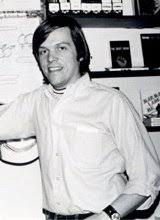 During the Stonewall Riots, it is said, Craig Rodwell called out "Gay Power" and shifted the “police riot” into a political demonstration. (NY Times reminiscence - 2009/06/26) Because of Rodwell and other radicalized Mattachine members’ passing out flyers, the demonstrations continued over three nights, and the Gay Liberation Front was formed, mostly by the gay hippies in the Village. Including Jim Fouratt—who is a regular at Austin’s SxSW Festival and OutFest. Rodwell’s partner Fred Sergeant was the model for Dick in the Dick & Jane Reader. (It is a marvelous twist of history that the founding of Gay Liberation came within one degree of separation of Dick, the model for the essential American boy.) Craig Rodwell was one of the founders of the annual parade to memorialize Stonewall. In some ways it was the Christopher Street Liberation Day March the next year commemorating Stonewall that was actually the event that created Gay Pride Marchs. 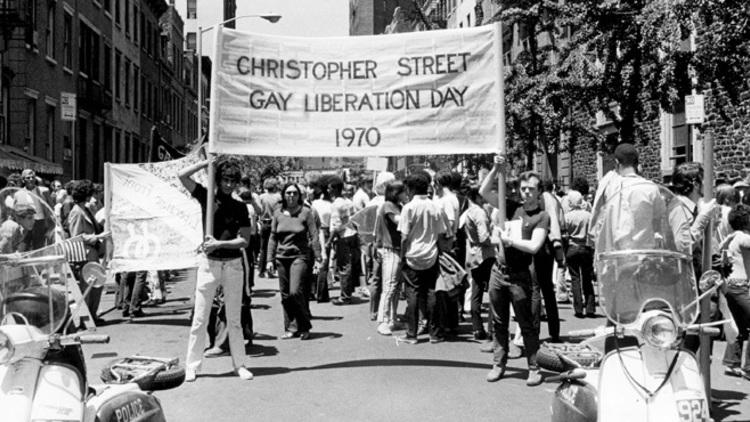 GLF was based on NLF, National Liberation Front, the people’s movement in Vietnam to overthrow the government of South Vietnam. So Gay Liberation Front placed itself right in the anti-war movement/youth movement. AND they chose the term gay people called themselves. Like the Blacks, and unlike the Jews, the GLFers did not try to reverse an anti-gay epithet, but to use the term gay people used themselves. “Gay” as it was used in the Gay Liberation Movement came to mean not only being homosexual, but knowing that you are, and understanding that that means you are part of a conscious community, and have political loyalties to your people and to the future. There is a generational aspect to the change in terms. “Gay Lib” came out of the Youth Movement and anti-war/peace & civil rights movements of the 60s and 70s. We didn’t identify with the older “homophile” generation. And so we changed the term. This same thing happened later with Gen X dropping gay in favor of queer. This is probably inevitable. Each new younger generation experiences themselves as different from the previous older generations—and not sexually attracted to the elders. Even then there was a feeling among many of the young gay activists that we resented being labelled. That “Unlabelled” quality is still part of the gay identifiers. I think the objection is less to self-awareness and understanding of one’s sexuality, than to other people assigning you a label and thinking that is what describes you. As this gay “consciousness” developed, it revealed more distinctions within this conscious community. In a way, the whole sexual liberation movement arose out of or at least in parallel with feminism and women’s consciousness. Women in GLF felt they were invisible because the term gay—and even homosexual—were understood by the public to mean mainly men. So the L was added to gay to recognize both male and female homosexuals: Gay Men and Lesbians. SO “gay” is used both as a generic jargon term for all things sexually deviant AND as a specific term for politically conscious gay men. In the generic use, there have always been heterosexually married homosexuals who performed heterosexually and homosexually. AND bisexuals who are attracted to both men and women. The latter “true bisexuals” experience a different consciousness from gay men, and felt they were made invisible in the G/L term, so B got added. In that same generic use, gay had always included both masculine and feminine homosexuals, some of whom cross dressed for costume, for stage, and for political satire of heterosexual styles—and for purposes of prostitution. And among the feminine homosexuals, some cross dressed because they felt themselves more womanly than manly. As consciousness evolved, a distinction became apparent between sexual orientation and gender identity. And people who were trans* in some way recognized they had a different consciousness from the gay men and lesbians. So T got added to make LGBT. Transvestite is yet something different, referring to heterosexuals who wear opposite sex clothing as a sexual fetish, not as a gender identifier. By the end of the 1970s, gay was becoming normalized and less radical. Gay was coming to refer to gay capitalism and glizty business—gay bars, gay baths. The political term also had this generic quality for some of the oppressive elements of the culture. In the early days Gay Liberation had sought to provide alternatives to the bars, and to liberate gay men from promiscuity and “the gay lifestyle.” The early gay rights movement was greatly concerned with giving gay people options outside the bars; the movement seriously critiqued the so-called gay lifestyle, and called for opportunities for more authentic meeting and friendship development. With the acceptance of homosexuality as real, what was called assimilation was seen to be threatening, that is, the idea that gay people are just like straight people in every way, except for what they do in bed and that didn’t matter. We just want to be like everybody else. 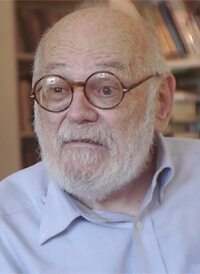 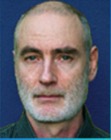 Harry Hay reappeared at this time, invited by Don Kilhefner (Wikipedia page) and Mitch Walker (Wikipedia page), two Jungian therapists who had a gay-affirmative healing center called Treeroots, to be the convenor for a gathering to celebrate the outsider/radical/hippie qualities of gay consciousness. This was the first Radical Faerie Gathering in Benson AZ in 1979. And gave a new identifier—Radical Faerie—for a particular kind of pro-sex, pro-homosexual, liberated gay consciousness. Hay’s comment was that what we do in bed is the only thing we have in common with straight people. Faerie recognized a “spiritual” quality to gay consciousness. Hay, Kilhefner and Walker et al argued that homosexuality is essential to the personality of gay men and lesbians. AIDS in the 1980s changed how these terms were valued. I note two specific phenomena: 1) “gay” became almost synonymous with having AIDS. Indeed AIDS was originally called GRID. So the positive self-identifier took on seriously negative connotations. One way to distance yourself from AIDS was to say you weren’t gay. The health-oriented organizations then had to coin expressions like MSM, men who have sex with men, but aren’t “gay.” And 2) because AIDS brought public attention to homosexuality and gay culture AND because the Internet was developing at the same time, children got exposed to the term “gay” and exposed to the concept of homosexuality before they were sexually mature enough to understand sexual desire and attraction. So “gay” just seemed creepy. “Gay” took on the connotation of being out-dated or un-hip and out of style. “That’s so gay!” Within the gay world, “gay” had also developed a connotation of being only white men with expensive tastes. The left-wing, Marxist identity was lost among a generation after the youth movement of the 60/70s. AND within the gay men’s world dominated by AIDS, anger was increasing because of the failure of medicine to find real cures and of government to deal with the problems of people with AIDS. In response to a wave of anti-LGBT violence in New York City in spring 1990, Queer Nation was started. Queer was used in the way “Jew” had been – a formerly negative derisive term reclaimed proudly and out of anger to “throw in the faces” of the oppressor. Queer also then became an umbrella term. And one which championed the commonality of all sexually-oppressed minorities. Queer also included anger at that stereotype of gay men as white, rich, narcissistic, and affluent. “Gay” as generic, as in “gay bar” or “gay baths,” implied a kind of sexual liberation, but also sexual excess. AND political conservative pundits began using the term “identity-politics” as a negative term to dismiss and demean the real political alliances that people in minorities who have real common identities (and identifications with each other) should naturally feel. “Identity” became a negative term. The development of consciousness of the various identities and gender variations has been a good thing and one of the great contributions of the sexual rights movement. As it has happened, it’s been by separating away from “gay” as the generic term, but also as the specific. So that gay male identity is also made invisible by the generic/umbrella use. The rise of LBTQIA+ has all happened by separating away from the G. While I like the term gay because it referencing way back to the societes joyeux of the Provencal counterculture of the middle ages, and because it’s a “happy” word, it will probably have to be replaced. Though it remains the common, umbrella, word used by all people—and still usually about gay men. I think gay men’s consciousness is naturally different from lesbians’, bisexuals’, transsexuals’ and even queers’ – though the queer term is more generational than identificational. But queer as an umbrella term runs into the same problem gay had in the 1970s: it is too inclusive and makes the various segments within it invisible. To the extent that the LBTQIA+ is all subtracted from the G in order to acknowledge the specific traits and identifies and characteristics of the now identified sub-groups, the G as umbrella is being emptied. G as “Gay Men” refers to a specific subgroup, with specific traits, identities and characteristics. The letters in the umbrella acronym are not in competition with or opposition to each other. I titled this essay "Wouldn't You Like to be a Uranian?" because I liked the original meaning. I think modern gay people as we now understand homosexuality and the range of sexual and gender diversity are indeed something new. We are self-aware in a way that our predecessors just didn't have the opportunity to be. And I think we SHOULD think of ourselves that way. The term is dated, of course, but the idea is as current as ever. Let's all be Uranians together! |
![]()
Toby Johnson, PhD is author of nine books: three non-fiction books that apply the wisdom of his teacher and "wise old man," Joseph Campbell to modern-day social and religious problems, four gay genre novels that dramatize spiritual issues at the heart of gay identity, and two books on gay men's spiritualities and the mystical experience of homosexuality and editor of a collection of "myths" of gay men's consciousness.
Johnson's book
GAY
SPIRITUALITY: The Role of Gay Identity in the Transformation of
Human Consciousness won a Lambda Literary Award in 2000.
His GAY
PERSPECTIVE: Things Our [Homo]sexuality Tells Us about the Nature
of God and the Universe was nominated for a Lammy in 2003. They
remain
in
print.
FINDING
YOUR OWN TRUE MYTH: What I Learned from Joseph Campbell: The Myth
of the Great Secret III tells the story of Johnson's learning the
real nature of religion and myth and discovering the spiritual
qualities of gay male consciousness.
